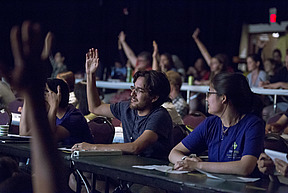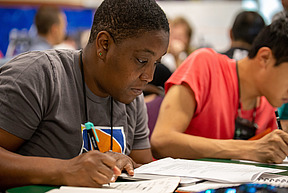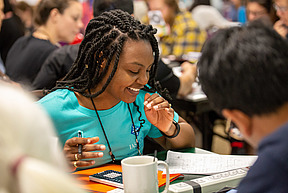
PCMI 2020 Teacher Leadership Program
Making Mathematical Connections
The Teacher Leadership Program (TLP) at the IAS/Park City Mathematics Institute (PCMI) Summer Session is a three-week residential professional development program for school teachers in grades 3-12, held in Park City, Utah, as part of the larger PCMI program that involves all members of the mathematics community. The purpose of the TLP is to provide opportunities for teachers to experience and enjoy mathematics while participating in developing the art of teaching. In addition, 6 quarter-credits of 400-level mathematics are available from the University of Washington for a modest fee.
The Teacher Leadership Program at PCMI will be held July 5-25, 2020.
The Teacher Leadership Program at PCMI is structured around three goals:
Teachers should be:
- continuing to learn and do mathematics
- analyzing and refining classroom practice
- serving as resources to colleagues and the profession.
These goals are reflected in the three strands that comprise the core summer courses and activities.
Goal 1: Math Course - Developing Mathematical Ideas
(2 hours per day)
In this course, teachers investigate an aspect of mathematics loosely related to the overall mathematical theme of PCMI, Number Theory Informed by Computation. The math course is a set of intricately sequenced questions that engage participants in doing mathematics, providing participants with the opportunity for authentic mathematical discovery. Through this experience, participants develop habits of mind for thinking about and doing mathematics, deepening their mathematical intuition, sense-making, and reasoning skills, along with reconnecting with the discipline as a learner.
Goal 2: Reflecting on Practice - Assessment of, for, and as Learning
(75 minutes per day)
Teaching consists of many moving parts including choosing tasks, managing discussions, providing feedback, and motivating students to learn. In summer 2020, TLP participants will consider research related to assessing student learning, including formative and summative routines and instruments, the nature and role of effective feedback, and implications for grading. This shared work will be grounded in the study of practice in both the United States and other countries, as participants collaboratively examine how to design better opportunities for all students to provide evidence of their growth as mathematics learners. Additional study will entail the use of assessment results to responsively shape instruction.
Goal 3: Working Groups
(2 hours, 4 days per week)
Each participant selected for the Teacher Leadership Program will be assigned to a small group focused on expanding their capacity as a resource to the school mathematics profession. While each working group will act as a distinct small learning community, with a distinct trajectory, they will all address the goal of personalized professional growth for participants. As part of the application process, prospective participants will be asked to ran their first, second and third choice for the Working Group.
All participants will be notified of their Working Group assignment as part of the acceptance process, prior to their arrival at PCMI.
Working Group choices:
- Academic Year Outreach (this group will include planning and revising PCMI-provided professional development including workshops, online lesson study, and networking opportunities for TLP alumni)
- Book Study (this group will select a math content or history book as the focus for an in-depth share examination driven by facilitated questions, and depending on the selected text, the possibility of interface with the author)
- Developing Professional Capacity (this group will support participants in expanding their knowledge base to take on a variety of leadership roles including but not limited to the department chair, peer coach, conference speaker or pd provider)
- Repository of the Wisdom of Practice (this group will continue work on creation of a prototype library seeking to document the shared knowledge of practice-based expertise of high-quality mathematics instruction)
- Research Course (this group will attend a theme-related course in the Undergraduate Summer School. This year's research topic will be Number Theory Informed by Computation)
- Three-Dimensional Printing (this group will explore the mathematics behind the creation of 3-D printed objects, and the potential for incorporating 3-D printing into school math instruction)
- Lesson Study (this group will collaboratively craft a detailed lesson plan; observe one of their own participants teach the lesson to local students; plus reflect, revise, and refine the lesson as a group)
- School Mathematics for Social Change (this group will focus on strategies that (a) support and empower students to take risks and position them as doers of mathematics; and (b) support and empower teachers to be facilitators of social change in or out of the classroom)


